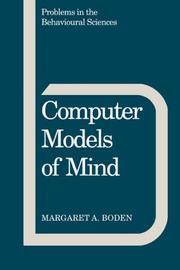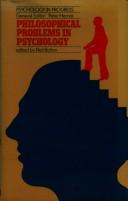| Listing 1 - 10 of 79 | << page >> |
Sort by
|
Book
ISBN: 9780521519298 9780521740203 0521519292 0521740207 Year: 2015 Publisher: Cambridge: Cambridge university press,
Abstract | Keywords | Export | Availability | Bookmark
 Loading...
Loading...Choose an application
- Reference Manager
- EndNote
- RefWorks (Direct export to RefWorks)
Our topic here is psychology, the self-styled science of the mind. Psychology's aim is to explain mental phenomena by describing the underlying processes, systems, and mechanisms that give rise to them. These hidden causal levers underlie all of our mental feats, including our richest conscious perceptions, our most subtle chains of reasoning, and our widest-ranging plans and actions. While the phenomena of mind are intimately related to events occurring in the brain, these psychological explanations are, we will argue, distinct and autonomous from explanations in terms of neural processes and mechanisms. According to the view we present here, psychology and neuroscience are different enterprises. We certainly wouldn't claim that our ever-increasing understanding of how the brain works has nothing to say to psychology: on the contrary, they are complimentary, since neuroscience can provide invaluable input to psychological theorizing (and vice versa, a point that we think is not stressed often enough). But our task will be to give a thorough account of the scope, methods, content, and prospects for a distinctive science of our mental lives.
Book
ISBN: 0814774024 Year: 1988 Publisher: New York London New York University Press
Abstract | Keywords | Export | Availability | Bookmark
 Loading...
Loading...Choose an application
- Reference Manager
- EndNote
- RefWorks (Direct export to RefWorks)
Psychology --- Philosophy. --- Philosophy --- Psychology - Philosophy.

ISBN: 352530322X 352530305X 9783525303054 9783525303221 Year: 2005 Volume: 22 Publisher: Göttingen: Vandenhoeck und Ruprecht,
Abstract | Keywords | Export | Availability | Bookmark
 Loading...
Loading...Choose an application
- Reference Manager
- EndNote
- RefWorks (Direct export to RefWorks)
Metaphysics --- Psychology --- Philosophy --- Philosophy. --- Philosophical anthropology --- Psychology - Philosophy --- Psychologie --- Philosophie

ISBN: 0521270332 Year: 1988 Publisher: Cambridge [England] New York Cambridge University Press
Abstract | Keywords | Export | Availability | Bookmark
 Loading...
Loading...Choose an application
- Reference Manager
- EndNote
- RefWorks (Direct export to RefWorks)
Psychology --- Computer simulation --- Philosophy --- Psychology - Computer simulation. --- Psychology - Philosophy.
Book
ISBN: 9781138827691 9781315530178 9781315530147 113882769X Year: 2016 Publisher: Boca Raton, FL Routledge, an imprint of Taylor and Francis
Abstract | Keywords | Export | Availability | Bookmark
 Loading...
Loading...Choose an application
- Reference Manager
- EndNote
- RefWorks (Direct export to RefWorks)
The idea that humans are by nature social and political animals can be traced back to Aristotle. More recently, it has also generated great interest and controversy in related disciplines such as anthropology, biology, psychology, neuroscience and even economics. What is it about humans that enabled them to construct a social reality of unrivalled complexity? Is there something distinctive about the human mind that explains how social lives are organised around conventions, norms, and institutions? The Routledge Handbook of Philosophy of the Social Mind is an outstanding reference source to the key topics and debates in this exciting subject and is the first collection of its kind. An international team of contributors present perspectives from diverse areas of research in philosophy, drawing on comparative and developmental psychology, evolutionary anthropology, cognitive neuroscience, and behavioural economics. The thirty-two original chapters are divided into five parts: The evolution of the social mind: including the social intelligence hypothesis, co- evolution of culture and cognition, ethnic cognition, and cooperation; Developmental and comparative perspectives: including primate and infant understanding of mind, shared intentionality, and moral cognition; Mechanisms of the moral mind: including norm compliance, social emotion, and implicit attitudes; Naturalistic approaches to shared and collective intentionality: including joint action, team reasoning and group thinking, and social kinds; Social forms of selfhood and mindedness: including moral identity, empathy and shared emotion, normativity and intentionality. Essential reading for students and researchers in philosophy of mind and psychology, The Routledge Handbook of Philosophy of the Social Mind is also suitable for those in related disciplines such as social psychology, cognitive neuroscience, economics and sociology.
Philosophy of mind --- Evolutionary psychology --- Sociobiology --- Social psychology --- Philosophy --- Evolutionary psychology - Philosophy --- Sociobiology - Philosophy --- Social psychology - Philosophy
Book
ISSN: 18664814 ISBN: 9783956500060 3956500067 Year: 2013 Volume: 33 Publisher: Würzburg: Ergon,
Abstract | Keywords | Export | Availability | Bookmark
 Loading...
Loading...Choose an application
- Reference Manager
- EndNote
- RefWorks (Direct export to RefWorks)
Die vorliegende vierbändige Ausgabe versammelt die meisten Schriften, die Theodor Lipps zur "Psychologie" und "Erkenntnistheorie" publiziert hat. Darüber hinaus stellt sie dem Leser zum ersten Mal sieben bisher unedierte Texte zur Verfügung, die in Lipps' Nachlass der Universitätsbibliothek München aufbewahrt werden. Ein Sachkommentar am Ende jeden Bandes erläutert die Schriften; eine allgemeine Einleitung des Herausgebers am Anfang des ersten Bandes stellt außerdem die Grundlinien von Lipps' Philosophieren vor. Von der Dissertation über die Ontologie Herbarts bis hin zu den letzten Aufsätzen vor seinem Tod bezeugt die vorliegende Edition die große Lebendigkeit von Lipps' Denken, welches sich durch theoretische Zäsuren kennzeichnet und dessen Entwicklung von den Auseinandersetzungen mit den wichtigsten zeitgenössischen Philosophen (u.a. E. Mach, A. Meinong, E. Husserl und W. Wundt) geprägt ist.
Psychology --- Knowledge, Theory of. --- Psychologie --- Théorie de la connaissance --- Philosophy --- History --- Philosophie --- Histoire --- Knowledge, Theory of --- Théorie de la connaissance --- Psychology - Philosophy --- Psychology - Philosophy - History
Book
ISBN: 270213159X 9782702131596 Year: 2007 Publisher: Paris: Calmann-Lévy,
Abstract | Keywords | Export | Availability | Bookmark
 Loading...
Loading...Choose an application
- Reference Manager
- EndNote
- RefWorks (Direct export to RefWorks)
Psychoanalysis --- Human body --- Psychanalyse --- Corps humain --- Psychological aspects --- Aspect psychologique --- Postmodernism --- Psychology --- Psychological aspects. --- Philosophy. --- Postmodernism - Psychological aspects. --- Psychology - Philosophy. --- Postmodernism - Psychological aspects --- Psychology - Philosophy

ISBN: 0792308506 9401074380 940092089X 9780792308508 Year: 1990 Volume: 214 Publisher: Dordrecht: Kluwer Academic Publishers,
Abstract | Keywords | Export | Availability | Bookmark
 Loading...
Loading...Choose an application
- Reference Manager
- EndNote
- RefWorks (Direct export to RefWorks)
Cognitive psychology --- Psycholinguistics --- Wittgenstein, Ludwig J.J. --- Psychology --- Philosophy. --- Wittgenstein, Ludwig --- Psychology - Philosophy. --- Psycholinguistics - Philosophy.

ISBN: 041670980X 0416709907 9780416709803 Year: 1979 Publisher: London: Methuen,
Abstract | Keywords | Export | Availability | Bookmark
 Loading...
Loading...Choose an application
- Reference Manager
- EndNote
- RefWorks (Direct export to RefWorks)
Philosophical anthropology --- Philosophy of science --- Psychology --- Psychologie --- Philosophy --- Philosophie --- Philosophy. --- Psychology - Philosophy
Book
ISBN: 2708936026 9782708936027 Year: 1979 Publisher: Toulouse: Privat,
Abstract | Keywords | Export | Availability | Bookmark
 Loading...
Loading...Choose an application
- Reference Manager
- EndNote
- RefWorks (Direct export to RefWorks)
Child psychology --- Psychology --- Enfants --- Psychologie --- Philosophy --- Philosophie --- Child psychology - France --- Psychology - Philosophy
| Listing 1 - 10 of 79 | << page >> |
Sort by
|

 Search
Search Feedback
Feedback About UniCat
About UniCat  Help
Help News
News